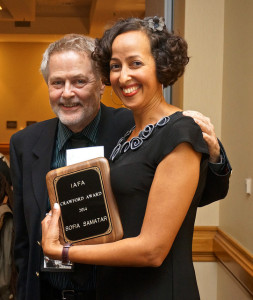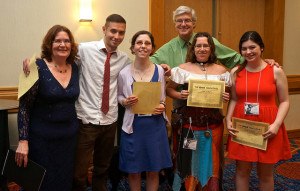Dear Graduate Students of IAFA,
I’m extending the deadline for sending in bios to run for Student Caucus Representative. We haven’t received enough submissions to hold an election yet, so now you have until the end of the day Friday, April 18. If you know someone who would be good at this job, poke them until they agree to run. If you have questions about what the job entails, feel free to email me (elizabeth-lundberg@uiowa.edu). I’m pasting below my original email, and I hope to hear from you soon!
Liz
—————
It’s that time again: we need to hold elections for the next Student Caucus Representative to the Executive Board. If you are interested in running, please send Liz Lundberg a short bio/statement for circulation to the caucus. These statements will be how the voters decide among candidates, so include any qualifications you have for the position, as well as any ideas for the caucus or for conference programming. Please also send a small headshot with your bio/statement. Send your statement and headshot to Liz at elizabeth-lundberg@uiowa.edu by the end of the day Friday, April 18.
More information about the election: Liz Lundberg will collect all bios and circulate a ballot the week of April 14. She will then collect all ballots and tally the votes. Voters will be asked to rank candidates, and in the event of a tie, Liz will apply instant runoff voting rules to the ballots to arrive at a winner. The runner up will be the Vice-Representative.
More information about the positions: Both the Representative and the Vice-Representative serve two-year terms (August 1, 2014 to July 31, 2016), so if you want to run, you should plan on being a student for at least two more years. Below are the official job descriptions for both positions. If you have any questions about either position, please contact Liz at elizabeth-lundberg@uiowa.edu.
Thank you, and I hope to hear from some of you soon!
Liz (and Daryl)
Job Description: Student Caucus Representative
Formal titles: Representative of the Student Caucus of the International Conference for the Fantastic in the Arts (SCIAFA)/ SCIAFA Representative to the Executive Board of the International Conference of the Fantastic in the Arts (IAFA)
The SCIAFA Representative is elected by the student body of the IAFA. During the two year term, the Representative is responsible for addressing and advocating for the needs of student members of IAFA. This responsibility includes representing student membership on the Executive Board of the IAFA (the SCIAFA Representative is serves on the Executive Board). The Representative must attend biannual board meetings during their term and participate in the Board’s online discussion list. At the conference, the Representative will run SCIAFA programming, including the SCIAFA Mentorship Program. The Representative is expected to attend all IAFA business meetings, as well as most Board-sponsored events. The SCIAFA Representative should remain visible and accessible for the duration of the conference both to assist and guide fellow students as well as to assist fellow Board members, organizers, and volunteers.
Job Description: Student Caucus Vice-Representative
Formal title: Vice-Representative of the Student Caucus of the International Conference for the Fantastic in the Arts (SCIAFA) (formerly the Shadow Representative)
The SCIAFA Vice-Representative is an elected position. The Vice-Representative runs for the full SCIAFA Representative position—the Vice-Representative position is filled by the runner-up. The duty of the Vice-Representative is to assist the Representative, this includes stepping in for the Representative in the event of emergencies or scheduling conflicts. The Vice-Representative is expected to attend all SCIAFA and Board-Sponsored events at the annual conference, but does not attend the summer board meeting (though the Vice-Representative should be available to attend in the Representative’s place if needed).

